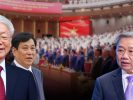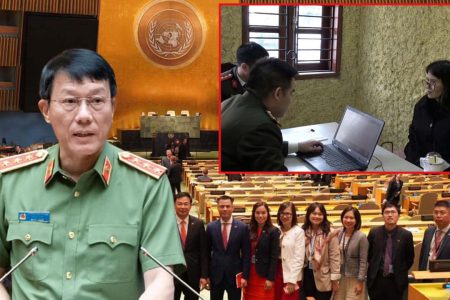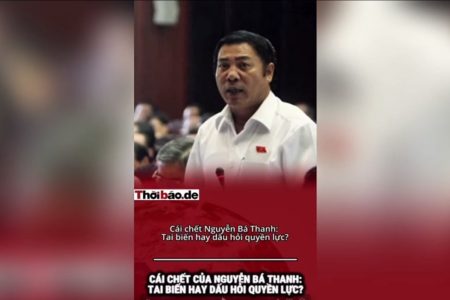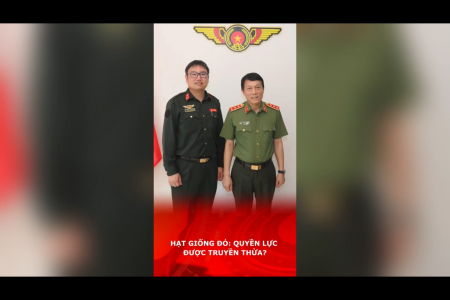The morning of September 7, 2020, is the first day the People’s Court of Hanoi hears the Dong Tam case in the scheduled 10-day trial series for this case.
From the inside of the courtroom, lawyer Ngo Anh Tuan noted the general scene as follows:
“The trial was carefully prepared, from security to the organization of the trial: security is closely monitored from a distance of hundreds of meters around the court area. Control of people entering and leaving the court area is carried out in many different rounds. The lawyers are equipped with computers to work relatively well. However, the fact that the court does not allow lawyers to park cars and the security forces do not permit them to park cars around the court area, making it difficult for lawyers to find parking spaces and many lawyers get wet when entering the courtroom.
About 50% of people in the courtrooms are judicial and police officers, no family members of the defendants can attend the trial and no ordinary people can enter the courtroom,” lawyer Ngo Anh Tuan described.

Journalist Pham Doan Trang records the summary information of the trial, which she titled as Murder by Trial with the following content:
Murder by Trial
The phrase “improper process and litigation procedures” is not enough to describe the trial of 29 Dong Tam residents that began in Hanoi this morning (September 7, 2020). The truth is much more horrific: this is a trial set up to normalize the silencing and murder of individuals.
At the opening of the trial, the court played a video for the lawyers and defendants…a “documentary report” on the wrongdoings of the Dong Tam residents (including the alleged murder of three police officers), as well as the tear-soaked words of friends and loved ones of these police officers.
The lawyers objected, asking that the court proceeds with hard evidence rather than a film, with its crew of producers, directors, and editors. The court, however, dismissed these concerns, telling the lawyers to simply “watch the film first.”
After the film was played and crimes against the accused announced, the terrifying reality of Vietnam’s police state was put on full and cruel display, judicial and executive branches merging into one.
All the defendants had confessional videos, prepared fully, carefully, and seamlessly by police. As each of the defendants’ names was read out, a clip of his or her confession was played.
However, each and every one of the defendants showed signs of torture or harassment so severe, they were unable to refuse “confessing.” One of the most severely beaten was Le Dinh Cong, Le Dinh Kinh’s son, who fully admitted guilt according to a prepared and meticulous script.
A number of “luckier” defendants were able to speak with their lawyers, revealing that they had been tortured until they could bear no more, that investigators pressured them to “just admit guilt now and retract it in court later”. But, in court, individuals who do just that are seen as stubborn and dishonest, their behavior is now seen as an aggravating circumstance. The court would also reject the defendant’s accusations of torture with a simple phrase: “no evidence.”
A number of others acquiesced to investigators after being told that “if you don’t admit guilt, you’re putting your family at risk…” The method is both fearsome and effective, for if some matter only involves an individual, then he or she can refuse to say anything, but if it involves loved ones, then he or she would do whatever it takes to protect them. The end result is a prisoners’ dilemma to out-“confess” one another, and ultimately, the entire house is arrested.
Elderly Bui Viet Hieu: Escaping deat by “stray” bullet
Elder Bui Viet Hieu, born in 1943, a member of the Dong Tam Consensus, and seen by police as second most-important figure behind elder Le Dinh Kinh— is perhaps the most indomitable and tenacious defendant.
In the courtroom, he revealed chilling details: both he and Le Dinh Kinh were shot the night of January 9, when police attacked Dong Tam; but while Kinh was shot through the heart, Hieu’s bullet “strayed,” hitting his stomach and resulting in serious injury (rather than death). Police brought him to the hospital, where it was written in his file that the cause of injury was… inconclusive.
As soon as he recovered, Hieu was immediately incarcerated, and today, he appeared in court as one of the four “leading” defendants, the most serious of charges.
The court also presented the video as evidence of Hieu’s guilt, including a video of his forceful pronouncements against police. However, these clips showed evidence of being doctored, with Hieu confirming in the courtroom that these pronouncements were outdated, that they were recorded in 2017 during the “hostage crisis” in Dong Tam (when 38 police officers were held by residents in April 2017). The “filmmakers” at the Ministry of Public Security had combined these images with more recent ones.
* * *
The torture and extortion in this case are so obvious and appalling, but the court rejected such assertions.
Defendants coerced into admitting guilt in order to save loved ones are now “retracted” by the court. Producing and editing documentary reports to incriminate has become a “trade”. Lawyers are unable to speak with their clients or receive any case information in full (in terms of time, space, fundamental materials) according to international standards. The court fails to take into account lawyers’ counterarguments.
All of the above demonstrate that the Dong Tam trial is simply a means to normalize the silencing and murder of individuals by some malevolent force (unknown perhaps even to the court and the police guarding it).
One can predict that there will be several death sentences handed out.

The series of requests of the lawyers made at the beginning of the trial was mostly rejected or the court ignored. The most important requirement is to summon a series of witnesses and persons involved in order to be able to reassess facts that serve as a basis for defense that have been dismissed by the court.
Important people directly related to the incident such as:
widow Du Thi Thanh, Mrs. Nguyen Thi Duyen; and former Hanoi Chairman Nguyen Duc Chung, representatives of the Hanoi Police Department, the working group which directly arrested the defendants and entered Mr. Le Dinh Kinh’s house on the night of January 9. The attorneys also demanded that the court not be silent but must state the reasons for not agreeing to summon these people.
Chairman Judge Truong Viet Toan stated that he did not agree to summon sacked Chairman Chung and a number of others because these people were „unrelated“ to the case.
Thus, while the lawyers made prior and in-court requests that the summoning of witnesses was important and relevant to the case, the court dismissed the request immediately with a brief statement “Not connected to the case,”- not an argument but an unilateral denial.
The most bizarre course of conduct was that the court brought the carefully edited video cut from multiple sources to show from the beginning as it was the obvious overwhelming truth over the defendants and the lawyers.
This is an unprecedented action, because the film is cut and edited into documentary reports that purposefully proves the deaths of three police officers, which is attributed to the killing of the people.
The charges should have come from the representatives of the People’s Court of Hanoi holding the prosecution right, but now the Court replaced the Procuracy’s roles as a way of overpowering and clearly violating the criminal proceedings.
According to the report of the lawyer Le Van Hoa, the defense lawyers requested to copy and present documents as evidence but were not satisfied.
Mr. Hoa said: „Our lawyers have requested at the trial to allow two videos of police attack on Dong Tam on January 9, 2020, but they did not respond. We suggest if they refused copying, they should show the video in court for everyone to see to determine the truth of the attack. However, this request was also denied.“
„Those are serious violations of the proceedings,“ Mr. Hoa affirmed.
The other more blatant offense was that the Court explicitly removed the right of lawyers to interact with the defendants in court, which was an unprecedented practice.

Finally, a complaint form „was made by lawyers at lunch time to be filed in court at the beginning of working afternoon.“ In which 10 lawyers signed, giving the basis that Judge Truong Viet Toan seriously violated the ethical and behavioral rules of the judge with the reference of fairness and equality and the principle of „judges are not allowed to cause difficulties for participants in the proceedings,” specifically the right to talk to the defendant of the lawyer.
Request made in writen form is that „the judge must immediately guarantee the right of contact between the lawyers and their defendants throughout the trial process.“
According to some private sources, the lawyers will continue to send applications to the Federation of Lawyers requesting to speak up to interfere with this request.
Thoibao.de (Translated)


























